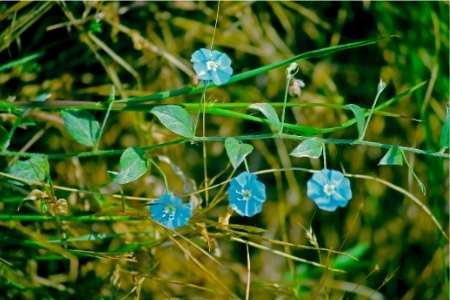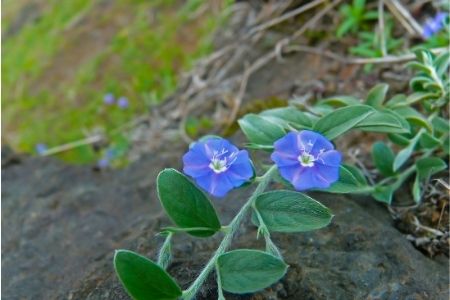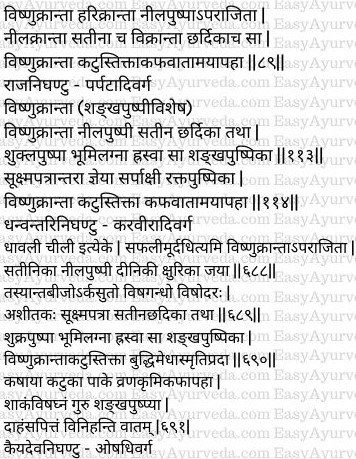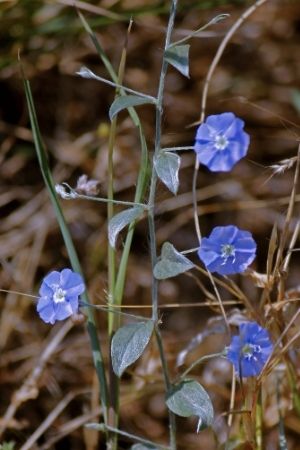Vishnukranthi (Evolvulus alsinoides) Uses, Qualities, Remedies, Research
By Dr Renita D’Souza
Vishnukranti (Evolvulus alsinoides Linn) is an Ayurvedic herbs which acts as brain and cardiac tonic. It is a good memory booster, stress buster and anti-inflammatory agent.
Table of Contents
Introduction

This plant is used to treat headache, burning sensation, diabetes, hypertension, asthma, uterine disorders, duodenal ulcers, dysentery and also used to promote conception. Its leaves possess antiasthmatic property. Flowers are used in uterine bleeding and internal hemorrhages.
Read – Aparajita – Clitoria ternatea Uses, Dose, Remedies, Side Effects
Botanical Name – Evolvulus alsinoides Linn
Synonyms – Evolvulus hirtus Lam.
Evolvulus angustifolius Roxb.
Convolvulus alsinoides L
Family – Convolvulaceae

Medicinal Qualities
Taste (Rasa) – Pungent (Katu), Bitter (Tikta)
Vipaka (Taste after digestion) – Pungent
Action (Karma) –
Budhi medha smriti prada – increases intelligence, wisdom and memory
The roots are sweet mixed bitter in taste and undergo sweet kind of bio transformation (Madhura vipaka).
The plant is cold in potency (Sheeta veerya) and possesses Rasayana – anti aging, rejuvenation and Medhya (memory enhancing) properties.
Ayurveda proclaims its potent effect with respect to the diseases like Apasmara (epilepsy), Unmada (mania), Anidra (insomnia), Bhrama (vertigo), Visha (poisoning) etc.
Remedies
- Whole plant decoction along with cumin and milk is used to treat general debility, fever, syphilis and loss of memory.
- Vishnukranti flowers taken with sugar acts as brain tonic.
- Leaves are used for herbal smoking to treat bronchitis and ashtma
- In depression and dysentery, the stem and root extract is used.
- Evolvulus alsinoides root decoction is consumed to treat cough and cold.
- In fever, leaf juice is consumed
- The powdered leaves of Evolvulus alsinoides are applied over sores and pounded leaves are applied over enlarged glands of the neck.
- Decoction prepared from its petals showed antifungal property.
Read – Ayurvedic Medicines For Memory: When And How To Take?
The below part is written by Dr MS Krishnamurthy MD(Ayu), PhD.
Stress, Insomnia
Fine powder of root in sleeplessness and stress related disorders:
Shade dried roots are collected and fine powder is made. This is taken in the dose of 1-2 gram once or twice a day, preferably at night along with a teaspoon of ghee. This helps to induce good sleep, relieve the stress and to calm down the mind.
Haematemesis
Fresh leaf juice in haematemesis (blood vomiting) and bleeding disorders:
The freshly collected leaves are crushed well and juice is obtained. To 5-10 ml of this juice, 5 grams of red sugar candy is added and administered. If required, a teaspoon of each of ghee and sugar candy are added, made into semisolid paste and administered. This helps to relieve haemetemesis , bleeding disorders, nasal bleeding etc.
Pyorrhea, dysuria
Hot or cold infusion in pyorrhea and dysuria:
Whole plant is taken and coarse powder is made. This is made into cold or hot infusion (a tablespoon is added to half a cup of hot or cold water, Kept for sometime, macerated and filtered). This is taken 3-4 times a day. It helps to relieve the complaints like pyorrhea , haematuria, dysuriaetc.
To improve intellect
For memory loss, to improve the intellect and to promote the digestive fire-medicated ghee of Vishnukranta:
Fresh plants are taken and fine paste is made. To this 4 parts of ghee and 16 parts of cow’s milk and 1/64 part of long pepper are added and ghee is processed. This medicated ghee is effective in memory loss, to improve the intellect, to promote the digestive fire and to check the chronic gastric irritation.
Ulcers, gastric irritation
Fresh leaf juice/whole plant for ulcers and gastric irritation:
Fresh leaf or whole plant juice is mixed with sweet buttermilk and administered in empty stomach (little cumin seeds are also added, on powdering). This is very effective in ulcers and gastric irritation.
Joint pain
Vishnukranthai for knee joint pain, Chikungunya arthritis:
The Ojhas in our body is that which causes self healing. Vishnukranthai directly improves immunity, thereby improving self healing potency of the body. It is an excellent supplement, post dengue/Chikungunya a fevers, as it relieves the resultant knee joint swellings and pains., Which has been a challenge to the modern medicines.
Peptic ulcer, hyperacidity
अथ विष्णुक्रान्ताकल्कः परिणामशूले-
विष्णुक्रान्ताजटाकल्कः सिताक्षौद्रघृतैर्युतः ।
परिणामभवं शूलं नाशयेत्सप्तभिर्दिनैः ॥ १७ ॥Sharangdhara Samhita, Madhyama Khanda, 5/17
A paste of root Vishnukranta is administered in a dose of 5 – 10 grams, once or twice a day, before or after food, along with equal quantities of candy sugar, honey and ghee. This remedy is administered for 7 days to treat Parinama Shoola – Abdominal pain due to peptic ulcer / hyperacidity.
Pharmacological Activities
Evolvulus alsinoides possess gastro protective, Anti bacterial, Antiulcer, Analgesic, immunomodulator, cytoprotective, adaptogenic, antiamnesic, anxiolytic, anti diabetic, and anti-inflammatory activities.
Effect on Doshas
Balances aggravated Kapha and Vata dosha
Therapeutic Uses
Vrana – wound
Krimi – worm infestation
Kapha Vata Amaya – Useful in disorders with imbalance of Kapha and Vata Dosha
Buddhiprada – improves intelligence
Medha prada – improves brain functions
Smruti prada – promotes memory
Shanka Vishaghna – useful in treating poisoning
Part Used
Whole plant
Dosage
Whole plant powder – 3- 6 grams.
Sanskrit Verses

Botanical Description
Evolvulus alsinoides is a perennial prostrate herb. Leaves are alternate, oblong-elliptic covered with silk hairs. Flowers are small, solitary with long pedicels, blue in color. Fruits are globular capsule.
Distribution
Evolvulus alsinoides Linn is present throughout the India, tropical Africa and worldwide. In India it is found in Andhra Pradesh, Bihar, Gujarat, Jammu & Kashmir, Himalayan ranges, Karnataka, Kerala, Odisha, Tamilnadu, Uttar Pradesh and West Bengal.
Controversy
Kaiyadeva Nighantu considered the plant with blue flower as Vishnukrantha (Evolvulus alsinoides Linn) and with white flowers as Shankhapushpi (Convolvulus pluricaulis Chois).
In South India Vishnukraanta (Evolvulus alsinoides Linn) is used as Shankhapushpi.
Read – Shankhapushpi Convolvulus pluricaulis Benefits, Dose, Side Effects
in action and uses of these herbs, Vishnukranta is unique in few aspects.
It is also called Neela shankhapushpi.

Varieties
Dhanvantari Nighantu have mentioned 3 varieties of Vishnukraanta based on color of its flowers
1. Neelapushpi
2. Shuklapushpa
3. Rakthapushpika
Chemical Constituents
Evolvulus alsinoides contains alkaloids, glycosides, Saponins and Terpinoids
Research
Anti inflammatory Activity – A research study conducted to evaluate anti inflammatory activity of Evolvulus alsinoides plant extracts have proved significant anti inflammatory activity of ethanolic extract of Evolvulus alsinoides plant.
Anxiolytic Activity – A study conducted to evaluate Anxiolytic activity of Evolvulus alsinoides and Convulvulus pluricaulis in rodents have concluded that extracts of both the drugs possess significant anxiolytic and antioxidant activities.
Classical Categorization
Kaiyadeva Nighantu – Oshadivarga
Dhanvantari Nighantu – Karaveeradi varga
Raja Nighantu – Parpataadi varga
Formulations
Bpewin Capsule – Used to maintain normal blood pressure
Somiwin Capsule – Treats Cognitive impairment, memory loss and anxiety diseases
BAN Baby Oil – Used as baby massage oil
Memocap Capsule – Used as memory tonic, improves analytical ability and memory power
Brenitone Tablets – Treats loss of memory, mental retardation etc
Vatha Sura Kudineer Chooranam – Used to treat vata disorders
Braino Sup tablet – improves grasping power, promotes concentration and focus
Jeevani Granules – Used as an immuno-modulator
Mentat DS Syrup – Improve mental quotient, memory span and concentration ability
Scientific Classification
Kingdom – Plantae
Division – Tracheophyta
Class – Magnoliopsida
Order – Solanales
Family – Convolvulaceae
Genus – Evolvulus
Species – E. alsinoides
Vernacular Names
English Name – English Speed-wheel, Slender dwarf morning-glory, dwarf morning-glory
Hindi Name – Shyamkranti, Sankhapuspi, Phooli, Sharikha-pushpi
Punjabi Name – Shankhpushpi, Kodyali
Bombay Name – Sankhavalli
Gujarati Name – Kalisankhavali
Malayalam Name – Vishnukranthi
Marathi Name – Vishnukanta
Tamil Name – Vishnukarandi, Vishnukaranthi
Telugu Name – Vishnukranta, Kancakura (A)
Sanskrit Name – Vishnukranti, Vishnugandhi
Sanskrit Synonyms
Vishnukraanta, Harikraanta, Nilapushpa, Aparaajita, Nilakranta, Sathina, Vikraanta, Chardika, Dhavali, Chili, Diniki, Kshurika, Jaya, Vishnukraanta, Harikraanta, Nilapushpa, Aparaajita, Nilakranta, Sathina, Vikraanta, Chardikaaca, Shuklapushpa, Bhumilagna, Hrisva, Shankapushpika, Sukshmapatrantara,
Sarpaakshi, Raktapushpika, Dhavali, Chili, Diniki, Kshurika, Vishagandha, Vishodara
Ashitaka, Sukshmapatra, Sukrapushpa









